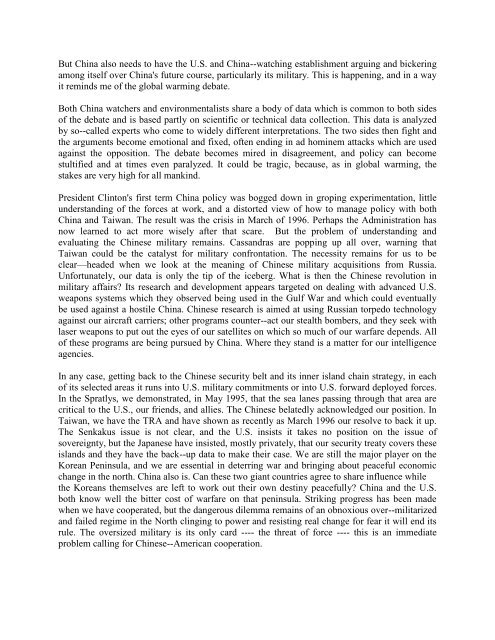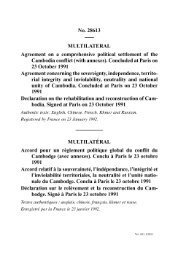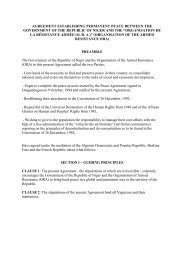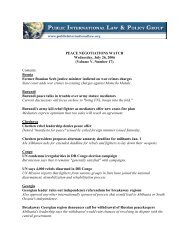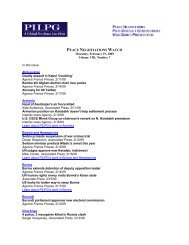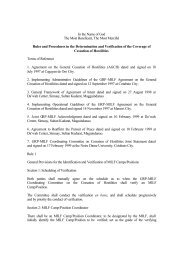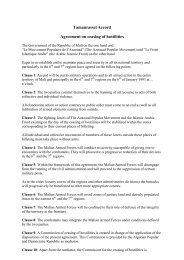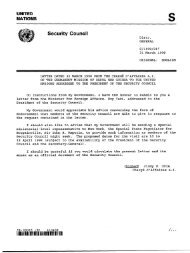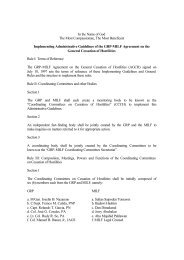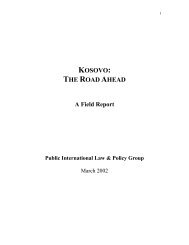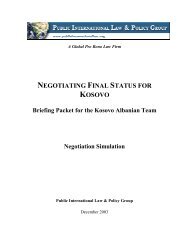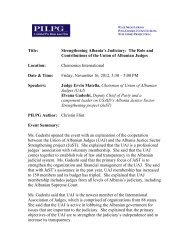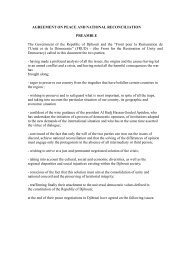The United States, China, and Taiwan - Public International Law ...
The United States, China, and Taiwan - Public International Law ...
The United States, China, and Taiwan - Public International Law ...
Create successful ePaper yourself
Turn your PDF publications into a flip-book with our unique Google optimized e-Paper software.
But <strong>China</strong> also needs to have the U.S. <strong>and</strong> <strong>China</strong>--watching establishment arguing <strong>and</strong> bickeringamong itself over <strong>China</strong>'s future course, particularly its military. This is happening, <strong>and</strong> in a wayit reminds me of the global warming debate.Both <strong>China</strong> watchers <strong>and</strong> environmentalists share a body of data which is common to both sidesof the debate <strong>and</strong> is based partly on scientific or technical data collection. This data is analyzedby so--called experts who come to widely different interpretations. <strong>The</strong> two sides then fight <strong>and</strong>the arguments become emotional <strong>and</strong> fixed, often ending in ad hominem attacks which are usedagainst the opposition. <strong>The</strong> debate becomes mired in disagreement, <strong>and</strong> policy can becomestultified <strong>and</strong> at times even paralyzed. It could be tragic, because, as in global warming, thestakes are very high for all mankind.President Clinton's first term <strong>China</strong> policy was bogged down in groping experimentation, littleunderst<strong>and</strong>ing of the forces at work, <strong>and</strong> a distorted view of how to manage policy with both<strong>China</strong> <strong>and</strong> <strong>Taiwan</strong>. <strong>The</strong> result was the crisis in March of 1996. Perhaps the Administration hasnow learned to act more wisely after that scare. But the problem of underst<strong>and</strong>ing <strong>and</strong>evaluating the Chinese military remains. Cass<strong>and</strong>ras are popping up all over, warning that<strong>Taiwan</strong> could be the catalyst for military confrontation. <strong>The</strong> necessity remains for us to beclear—headed when we look at the meaning of Chinese military acquisitions from Russia.Unfortunately, our data is only the tip of the iceberg. What is then the Chinese revolution inmilitary affairs? Its research <strong>and</strong> development appears targeted on dealing with advanced U.S.weapons systems which they observed being used in the Gulf War <strong>and</strong> which could eventuallybe used against a hostile <strong>China</strong>. Chinese research is aimed at using Russian torpedo technologyagainst our aircraft carriers; other programs counter--act our stealth bombers, <strong>and</strong> they seek withlaser weapons to put out the eyes of our satellites on which so much of our warfare depends. Allof these programs are being pursued by <strong>China</strong>. Where they st<strong>and</strong> is a matter for our intelligenceagencies.In any case, getting back to the Chinese security belt <strong>and</strong> its inner isl<strong>and</strong> chain strategy, in eachof its selected areas it runs into U.S. military commitments or into U.S. forward deployed forces.In the Spratlys, we demonstrated, in May 1995, that the sea lanes passing through that area arecritical to the U.S., our friends, <strong>and</strong> allies. <strong>The</strong> Chinese belatedly acknowledged our position. In<strong>Taiwan</strong>, we have the TRA <strong>and</strong> have shown as recently as March 1996 our resolve to back it up.<strong>The</strong> Senkakus issue is not clear, <strong>and</strong> the U.S. insists it takes no position on the issue ofsovereignty, but the Japanese have insisted, mostly privately, that our security treaty covers theseisl<strong>and</strong>s <strong>and</strong> they have the back--up data to make their case. We are still the major player on theKorean Peninsula, <strong>and</strong> we are essential in deterring war <strong>and</strong> bringing about peaceful economicchange in the north. <strong>China</strong> also is. Can these two giant countries agree to share influence whilethe Koreans themselves are left to work out their own destiny peacefully? <strong>China</strong> <strong>and</strong> the U.S.both know well the bitter cost of warfare on that peninsula. Striking progress has been madewhen we have cooperated, but the dangerous dilemma remains of an obnoxious over--militarized<strong>and</strong> failed regime in the North clinging to power <strong>and</strong> resisting real change for fear it will end itsrule. <strong>The</strong> oversized military is its only card ---- the threat of force ---- this is an immediateproblem calling for Chinese--American cooperation.


